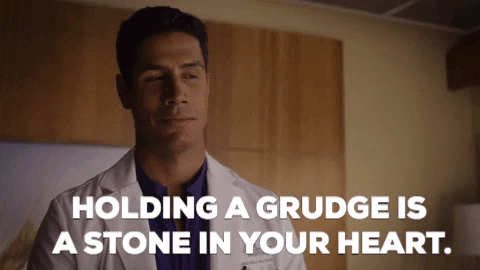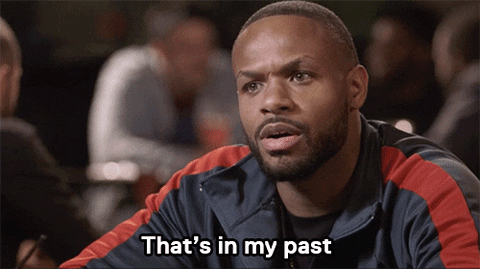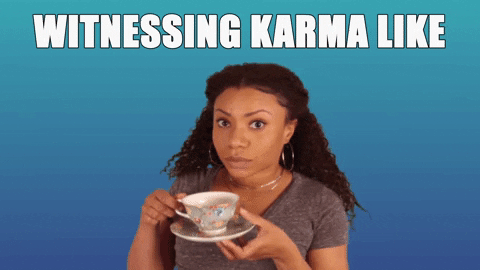
Yeah. I'll be the first to raise my hand in this class and say that forgiveness is a process. What I mean by that is, whether you choose to forgive someone while looking them dead in the eye, while journaling at home or while standing at the foot of an altar, rarely do you say the words, "I forgive you" and, immediately following, everything is fully resolved. Or healed. When you decide to forgive someone via your words, it is basically like making a public declaration that you are going to put yourself on the path to, as the dictionary definitions of the word state— "to grant pardon for or remission of (an offense, debt, etc.)"; "to cease to feel resentment against and absolve (to cancel an indebtedness or liability of", or "to set free or release, as from some duty, obligation, or responsibility)".
Pardon. Not resent. Release. Hmph. No wonder so many mental health professionals say that when we choose to forgive a person, it's far more for our benefit than it is for theirs; that to choose (because it is always a choice) to hold onto the fallout of our experiences is holding us back, stressing us out and, according to many reports, even making us sick. No joke. There are studies that reveal unforgivingness can keep you in a state of anger and raise your blood pressure. Unforgivingness can also increase levels of depression and PTSD. Shoot, unforgivingness can even cut your lifespan short. And really, y'all, is holding a grudge really worth all of that?
That's why I wanted to take out a few minutes of your time to first say, if you know there is someone you need to forgive, for your own health and well-being, please consider doing so. And second, if you're reading this and you someone who hurt you, offended you and/or totally pissed you off immediately comes to mind, just to make sure that you're as free from the situation as you may believe that you are. You can do this by going down this checklist of signs that a person isn't as good at forgiving as they might think that they are.
Why Is Forgiving So Hard to Do?

Since most of us know that bestowing forgiveness is essential in life (because none of us is perfect, right?), why is it that so many of us seem to struggle so much with forgiving others? In a good article that I read on the topic, the author brought up three good points. A lot of us don't forgive others because 1) we don't want the "offender" to think that what they did was OK; 2) we don't think that the person who hurt us deserves forgiveness, and/or 3) we don't trust them. Thanks to my own forgiveness journey, what I have learned is, far too often we are hesitant or even afraid to forgive someone because we think that forgiveness and reconciliation are one in the same, when that is not even remotely the case.
You forgive as a way to heal from the hurt or harm that was done to you. You also forgive in order to release yourself from the temptation to keep the cycle of pain going by hurting or harming the other person (or someone else because you are still holding onto unforgivingness).
Reconciliation is another matter entirely. If it is even on the table for discussion, the offender has some work to do in order to restore what has been lost (and if they are truly sorry, they are all for putting the sweat equity in with their words and actions—no question about that). So no, never feel that just because you have forgiven someone that you are invalidating your feelings about the offense or that you have to have the same kind of relationship with them moving forward. Forgiveness isn't designed to make you more vulnerable; it's actually meant to empower you by helping you to let the pain, fear and frustration go.
Now, with all of this out of the way, here are some pretty telling signs that you're not as good at forgiving as you probably need to be.
1. You Don’t Really Ever Let Things Go

Something that I deal with a lot in marriage counseling are people who forgive with their mouths but not necessarily via their actions. What I mean by that is, although one spouse will claim that they've forgiven their partner for something that they've done, the moment they do something else that they don't like, the past issue comes up. It's almost like they hold onto it like a trump card to use in an argument in order to "win" it. Nothing healthy comes out of it because really, who wants to constantly hear about their past missteps and mishaps all of the time?
Say that you are married, your husband misspends some money and it caused a check to bounce. You talk it through and then tell yourself and him that you are willing to let it go. But then he forgets to pay a different bill five months later and you bring his misspending from before up, even though these are the only times in recent history that it has happened. This is a good example of not being able to let things go.
If your man really isn't the best with money, perhaps it's time for you to handle the finances or for you guys to get a financial consultant. But to berate him every time he does something, even though you claim you've forgiven him, means that you actually didn't. Not only that, but the more that you "stockpile" his mistakes, the harder it will be to get past a challenge or problem the next time one comes up.
Interestingly enough, this is one of the reasons why a lot of couples end up divorcing after 20 years of marriage; they never really forgave each other for much of…anything really. And you know what they say—eventually a collection of snowflakes end up turning into a huge avalanche.
2. You Take “Forgive but Don’t Forget” Totally Out of Context

One time, I heard a guy named Cedric Dent say something about forgiveness that I think is pretty good. He used the hypothetical example of him telling someone something in confidence, them turning around and telling other people, and then them ultimately asking for forgiveness for the betrayal. According to Cedric, the best way to handle an instance like that is to forgive the person, but to also not tell them any more secrets for a while. It's not because you are holding things over them; it's actually their actions have shown that they have a weakness when it comes to respecting someone else's privacy.
I think this is the healthy way of applying the old adage "forgive but don't forget". You're not "not forgetting the offense" in order to weaponize the offender with it later up the road. You're using it as a teachable moment so that you can do all that you can to prevent being in a similar situation again. It's not about holding something over a person; it's about making sure that you apply wisdom in the future. No more, no less.
That said, forgiving while not forgetting shouldn't be about not being open to giving someone another chance. It's simply about asking yourself, "What did I learn from this experience?" and then applying it across the board. For instance, if someone revealed one of your secrets, what's the lesson? Perhaps it's something as simple as learning how to vet people better in the future. "Not forgetting" should be more about how the situation can make you better rather than how to make someone feel like they cannot be redeemed for what they have done. If you've truly forgiven them, sometimes they can be—once trust has been restored. It's close to impossible for that to happen if you're holding onto the out of context take of "forgive but don't forget".
3. You Lack Empathy in the Forgiving Process

I remember when I got my first abortion and a "friend" that I went to school with, who was a virgin at the time, told me that I was going to go to hell for it. Fast forward to her having a late period two years later and—surprise, surprise—she was asking me what clinic I went to for my procedure.
Yeah, it can be really easy to think that someone is not worthy of your forgiveness—or forgiveness, in general—when you haven't done anything similar to what they did to you (or you have selective memory when it comes to some of the past things that you have done). But we've all done something that some human, somewhere, would deem "unforgivable". Not only that but, if a lot of us were truly honest with ourselves, the reason why we don't extend the forgiveness is because, on some cryptic level, we want to have some sort of power over the person who offended us.
I can speak from very up close and personal experience that the sooner you bring empathy—" the power of understanding and imaginatively entering into another person's feelings"—into play, the sooner your heart will soften to a situation; any situation, really. Try it.
4. You’re Stuck in the Past

An author by the name of Criss Jami once said, "Grudges are for those who insist that they are owed something; forgiveness, however, is for those who are substantial enough to move on." Now put a pin in that as we touch on the main points from the article, "8 Signs You Have NOT Forgiven Someone", the author shares some of the following points.
Here's how to tell if you still need to do more forgiveness work. When you:
- Use what the person said or did as a topic of conversation.
- Daydream about getting revenge or some kind of justice. A good example of this is attending your high school reunion and showing them.
- Preoccupy your mind day in and day out either reliving or dwelling on the situation or the person's behaviors.
- Get annoyed if someone even mentions the person.
- Have a tendency to avoid the person.
- Are secretly delighted to hear about the person's current difficulties and losses.
- Strongly believe you have been unfairly treated and are an innocent victim.
- Have friends and family that are tired of talking about the person and the latest drama.
In another article on forgiveness, the author said this:
"…forgiveness brings the forgiver peace of mind and frees him or her from corrosive anger. While there is some debate over whether true forgiveness requires positive feelings toward the offender, experts agree that it at least involves letting go of deeply held negative feelings. In that way, it empowers you to recognize the pain you suffered without letting that pain define you, enabling you to heal and move on with your life."
Something that a lot of us refuse to acknowledge or accept about forgiveness is that it can keep us mentally, emotionally and relationally stagnant. Here's an example. Back when I was dating my late fiancé, it took for-e-ver to let him fully into my heart and life because my first love had done so much emotional damage. Looking back, I stand amazed by how much my fiancé was able to tolerate me bringing up my ex or sometimes even comparing the two of them. By the time I finally did let my guard down, Damien (my fiancé) died just a few months later.
That's the thing about unforgivingness. In order to remain in that head and heart space, you have to keep thinking and looking backwards. And that is what can prevent you from truly moving forward. Hmph. The real "ouch" about that is while you're still stuck in your past, there's a pretty good chance that your offender…isn't. They are moving right along.
5. You Think That Karma Is YOUR Job

If you hop on Google, put "karma quotes" in the search field and then click on the "images" tab, you'll see a slew of karma references. Two that cracked me up were "Karma's just sharpening her nails and finishing her drink. She'll be with you shortly" and "In the end, karma will be a bigger bitch than I'll ever need to be". Two that had me like "hmm" were "Karma isn't a bitch, it's a mirror" and "You will never understand the damage you did to someone until it's done to you; that's why I'm here. Signed, Karma." But the quote that all of us should keep in mind as it relates to forgiveness is the one by Dr. Wayne Dyer—"How people treat you is their karma. How you react is yours." (Louder for the seats in the back, please.)
Although most of us consider karma to be "what goes around comes around", did you know that another definition of the word is "destiny" or "fate"? I can personally attest to the fact that karma has a way of handling what someone has done (ourselves included) in a way that we couldn't even begin to come up with on our own. Plus, when we let karma do its thing without trying to help it along, we avoid reaping seeds of bitterness, resentment and revenge.
Along these same lines, the Bible tells us that we reap what we sow (Galatians 6:6-10). What's really a trip about that Scripture is it doesn't put an expiration date on when that reaping will happen. The warning here is that you only waste time and bring unnecessary drama into your own life if you think it's better to be the "karma bestower" rather than forgiving someone. What's really crazy is, by trying to do karma's job, you keep the vicious cycle going—and usually end up doing further harm to yourself. (Something that unforgiveness knows will happen, by the way.)
Bonus: If You’re a Christian, You Don’t Factor in Just How Much You Need to Forgive

If you're a Christian (or you're simply someone who tries to apply biblical Scripture to your life as much as possible), I think it's imperative that I end this article on forgiveness on a particular note. Matthew 6:14-15(NKJV) tells us, "For if you forgive men their trespasses, your heavenly Father will also forgive you. But if you do not forgive men their trespasses, neither will your Father forgive your trespasses."
What this basically means that in order to be forgiven by God, we need to forgive those around us. It's a Scripture that actually keeps me pretty humble because it reminds me that just like I need to forgive others for what they've done, there is stuff that I do that I need to be forgiven by the Most High for; that nothing should keep me from wanting to live a free and forgiven life so that, at the very least, I can spiritually thrive as an individual.
True forgiveness ain't easy. Not by a long shot. But if you really want to evolve and heal as an individual, it's important that you do it. Not the "bad way" (you know, saying that you do even if you don't really mean it); the right way. Hopefully this article helped to point you in the direction of just that.
Forgive. So that your karma will bring forgiveness unto you. Amen. So be it, sis.
Want more stories like this? Sign up for our newsletter here and check out the related reads below:
How I Learned To Forgive People In My Life That Weren't Sorry
Jada Pinkett Smith Reminds Us Forgiveness Isn't About The Other Person
Why I Don't "Cut People Off" Anymore, I Release Them Instead
Feature image by Shutterstock
- When Forgiving Yourself Is the Hardest Kind of Forgiveness ... ›
- Can You Ever Forgive Me? review – horribly hilarious odd-couple ... ›
- Read This If There's Someone You Can't Forgive | Thought Catalog ›
- 5 Ways to Help Yourself Get Over a Big Mistake | Inc.com ›
- How to Forgive Someone Who Has Wronged You ›
- How Do You Forgive Even When It Feels Impossible? (Part 1 ... ›
- How To Forgive Someone Who Has Hurt You: In 15 Steps ›
- Why You Don't Always Have to Forgive | Psychology Today ›
Your December 2025 Monthly Horoscopes Are All About Surrender & Alignment
December is about letting go. We end the year with the need for more peace, reflection, and rejuvenation, and that is exactly what December is providing for us. The Sun is in Sagittarius, and anything is possible. This is the month to believe in that and to know that the universe is supporting you. With a Supermoon in Gemini as we begin the month as well, we have an opportunity to gain the closure we have been looking for this year and to wrap up old projects, ideas, and communication breakthroughs.
This is the month to make your peace the priority and let go of trying to control the way the tides are turning. Trust in your new beginning, and give yourself time to prepare for it this month.
A big part of the clarity that is coming through this month is due to Neptune going direct in Pisces on December 10, after being retrograde here since July. With Neptune now direct, we are able to see our inspiration and creativity a little more clearly, providing the perfect energy for dreams and manifestation to be built upon. The smoke is clearing, and it’s up to you to decide what you want to do with this newfound clarity that this transit is bringing. Mercury also moves back into Sagittarius on December 11, which is great for communication and clarity, and the adventures you were trying to see through at the beginning of November come around for you again with greater purpose and support.
On December 15, Mars enters Capricorn until the end of January 2026, and this is the extra push we need to make important changes and to be on the path towards greater abundance, stability, and prosperity. Mars in Capricorn takes care of business, and we have extra energy at our disposal during this time to do so. This transit is an ideal time to focus on your career or financial goals for next year and to start putting some of these plans into motion now. A few days later, we have the New Moon of the month, which will be in Sagittarius on December 19, and this is the perfect New Moon to manifest.
The energy is high, magic is in the air, and it’s all about moving forward with the new beginnings that are inspiring you and bringing you joy to think about right now.
Capricorn Season officially begins on December 21, and this earth sign energy is how we heal, gain closure, and build new foundations in our world. With Venus also moving into a Capricorn a few days later, there is something about peace, prosperity, and security that we are gaining in life and in love as we close out the year, and this is what we need right now. This month is about reflecting on what was, letting go of old hurt, and renewing. December is an ending and a new beginning in one, and there is magic in this space to be created.
Read for your sun and rising sign below to see what December 2025 has in store for you.
 AriesKyra Jay for xoNecole
AriesKyra Jay for xoNecoleARIES
December is a full-circle moment for you, Aries. You are seeing the gifts in your world and have a lot of gratitude for the way things have come about for you as of late. There are culminations in your world that are providing you with more abundance, stability, and community, and you are exactly where you are meant to be this month. With the Sun in a fellow fire sign and in your 9th house of travel for most of the month, December is a good time to get out of your comfort zone, explore the world around you, and get your body moving.
Mars, your ruling planet, also makes a change and moves into Capricorn on December 15, which will fuel your inspiration and power in your career space. You are making a lot of professional progress as we close out the year; however, make sure to be more mindful of your competitive drive right now. The New Moon on December 19 is the perfect opportunity for you to create some new plans and goals when it comes to traveling, education, and where you want to gain some new inspiration in your world. Overall, this is a month of things coming together for you serendipitously.
 TaurusKyra Jay for xoNecole
TaurusKyra Jay for xoNecoleTAURUS
December is about trusting your intuition, Taurus. You have a lot on your mind this month, and it’s best to delegate, communicate, and allow yourself some relief by opening up to someone and not feeling like you have to hold everything in. As we begin the month, we have a Supermoon in Gemini happening in your house of income, and the plans and projects you have been building here come to fruition for you now. This is the time to gain clarity on your financial world and to take a look at what spending habits you want to let go of here as well.
With Venus in your 8th house of shared resources for most of the month, you are doing a cleanse on your commitments, partnerships, and business ventures. You are taking a look at what you want to dedicate yourself to in the future, and what commitments you may need to let go of now in order to be in the space you truly want to be, both financially and within some of your relationship dynamics. Before we end the month, we have a New Moon in this same area of your chart, and it’s time to look at the opportunities that are presenting themselves and to trust your internal guidance system to lead you forward.
 GeminiKyra Jay for xoNecole
GeminiKyra Jay for xoNecoleGEMINI
You are moving forward fearlessly this month, Gemini. December is your month of love, passion, and dignity, and you are owning the light that you shine. We begin the month with the last Supermoon of the year, happening in your sign, and you are stepping up to the plate. You are showing up, owning how much you have grown this year, and allowing yourself to heal while also acknowledging that you have done your best and you deserve to have fun in the midst of the changes you are creating.
Mercury, your ruling planet, is officially out of retrograde, and you can use this energy to the fullest potential now. With Mercury in your 7th house of love, it’s time to speak from the heart and to talk about the things that matter and that are inspiring you right now to your loved ones. You never know what kind of epiphanies you may have when you open up the conversation to others. Before the month ends, you have a New Moon in this same love area of your chart, and this New Moon is all about manifesting romance, commitment, and abundance in your world.
 CancerKyra Jay for xoNecole
CancerKyra Jay for xoNecoleCANCER
December is an opening for more love, more joy, and more freedom in your life, Cancer. You have come to a place where you hold so much gratitude in your heart for where you are today and where your heart is shining, and things come together for you with more ease right now. With the Sun in your 6th house of health, work, and daily routines for most of the month, you are getting your ducks in a row while also putting more energy and effort into taking care of yourself, your priorities, and your well-being. This month surprises you in many ways, and it’s because you are showing up.
Mars and Venus both move into your house of love, relationships, marriage, and abundance this month, and you are making strides in your love life. You have both of these opposing forces on your side and are being recognized for the love you are while also receiving the love you want. This month, overall, is about focusing more on the positives in your world and letting your heart have its joy. Before December comes to an end, there is a New Moon in Sagittarius, and this is the perfect opportunity to create the plans you want to see through next year, especially when it comes to your work life, colleagues, business ventures, and health.
 LeoKyra Jay for xoNecole
LeoKyra Jay for xoNecoleLEO
The scales of karma are balancing, and they are balancing in your favor this month, Leo. December is your month of truth, and of seeing it clearly in your world. The Sun is in your house of romance, pleasure, and happiness for most of the month, and it’s time to relax, be in the present moment, and allow what is meant to be, to be. With a Supermoon in your 11th house of manifestation as December begins, this is a powerful month for seeing your dreams come to fruition, and for feeling like the intentions you have set this year are finally here for you now.
Mars also moves into your 6th house mid-month, and this is the perfect energy to have to move into the new year. You have extra energy at your disposal right now and are feeling fearless with what is possible for you and your daily routine. Before the month ends, we also have a New Moon in a fellow fire sign, Sagittarius, and this is a breakthrough moment for you and your heart. December, overall, wants to show you how loved and supported you are and will be doing so in magical, unexpected, and concrete ways.
 VirgoKyra Jay for xoNecole
VirgoKyra Jay for xoNecoleVIRGO
December is a month of victory, Virgo. You are showing up and experiencing some new successes in your world that move you forward on your path in life. With a Supermoon in your 10th house of career as we begin the month, the effort and intentions you have made this year come into full bloom, and you are being recognized for who you are and the good work you have done. This month is all about showing up and allowing yourself to be seen and loved, knowing that you deserve the support and opportunities you are receiving.
Mars moves into Capricorn on December 15, which brings the passion and excitement into your love life, hobbies, and little pleasures in life that light you up. You want to have fun this month and are going to be walking into the new year with this fearless, happy, and spontaneous energy within you. Before the month ends, Venus also enters Capricorn, and in this same area of your chart, you have a lot to look forward to and believe in right now. Overall, December wants you to be happy and will be doing everything possible to make that happen for you. This is your month to shine, Virgo.
 LibraKyra Jay for xoNecole
LibraKyra Jay for xoNecoleLIBRA
December is a month of opportunity for you, Libra. New doors open, and you are financially making breakthroughs this month because of it. December begins with a Supermoon in your 9th house, and you are getting a clearer view of where you have been making strides in your life and how it has all brought you here to this present moment of freedom. This month is showing you what happens when you are fearless with your purpose and when you believe in yourself and what you are worthy of.
Moving further into December, Mars moves into your 4th house of home and family mid-month, and you are closing out the year in your safe spaces. You are spending more time with your loved ones and taking the time to quiet your mind and listen to what your heart has been telling you. Before the month ends, we have a New Moon in Sagittarius, happening in an area of your life that deals with communication. This is a great time for getting the answers you have been looking for and for feeling more clear-headed and confident about the decisions you are making as you move into the new year.
 ScorpioKyra Jay for xoNecole
ScorpioKyra Jay for xoNecoleSCORPIO
Patience is a virtue this month, Scorpio. December is all about remaining patient and vigilant with what you are creating in your world, and knowing that the universe has your back. It’s time to be reminded of the power of hope, and this month is an opening to greater clarity in your life. There is a lot of energy in your financial zones right now, and this is providing you with new opportunities and new insight; however, the speed at which things come about for you may feel daunting. Keep your head up and eyes focused on what you want and know that you are more than worthy of receiving it.
With Mercury in your 2nd house of income this month, December is a good time to plant new seeds and to think about where you want to be financially a month from now or even a year. This month is asking you to think bigger and to think more long-term so that you can set the appropriate plans into motion now. We also have a New Moon in your house of income before the month ends, and this is when you will see more of your dreams come to fruition in this area of your life, and have more opportunities to build. Overall, December will be teaching you a lot, Scorpio.
 SagittariusKyra Jay for xoNecole
SagittariusKyra Jay for xoNecoleSAGITTARIUS
Sagittarius Season is here, and there is a lot in store for you this month, Sag. December is all about what you are dedicating yourself to. It’s about setting your intentions and putting the work in to back up your dreams, and about getting things in order so that when the new beginnings come, you are ready for them. The Sun and Venus are in your sign for most of this month, and there are a lot of eyes on you right now. You have the potential to create a new beginning for yourself, and it’s time to invest in yourself, your love life, and your dreams.
Mercury moves into Sagittarius on December 11, and this is giving you another opportunity to see through some of the plans that you had initiated in November. Mercury was retrograde in your sign last month, and there may have been some disruptions to your vision and plans for the future, and now this energy is turning around for you. Before the month ends, we also have a New Moon in Sagittarius, and you are walking through new doors fearlessly. You are catching others by surprise by your growth this month, and you are thinking a lot about your purpose, future, and plans for the new year.
 CapricornKyra Jay for xoNecole
CapricornKyra Jay for xoNecoleCAPRICORN
December is all about the vision, Capricorn. You are moving through a lot of changes and transformations this month, yet they are giving you a chance at a new beginning in the process. You are focused more on the future and what goals you want to manifest for yourself right now, and are ready to let go of what hasn’t been working for you. With the Sun in your 12th house of closure for most of December, this is your time for healing, but remember, healing doesn’t have to be isolating or boring; you can thrive while you renew, and you are this month.
Mid-month, the excitement picks up for you, and you are feeling more energized than you have in a while. Mars moves into Capricorn until the end of January 2026, and you are being proactive with your goals, intentions, and passions. You are a force to be reckoned with this month, and you are making things happen for yourself with confidence. Capricorn Season officially begins on December 21 this year, and this is definitely speeding up your healing process. You are breaking free from what was, and with Venus also moving into Capricorn before the month ends, you are leaving this year in high spirits and with love opening a new door for you.
 AquariusKyra Jay for xoNecole
AquariusKyra Jay for xoNecoleAQUARIUS
December is all about community, creativity, and manifestation, Aquarius. This is the month to work together with others to help bring your dreams to life. You are in a space of inspiration, empowerment, and beauty, and are creating more of this energy around you and in your world. Look out for what support comes your way this month and know that you don’t have to do everything alone to succeed. With the Sun in your 11th house of manifestation and friendship, your intentions are coming to fruition, and it’s time to celebrate with the people you love and to own how far you have come this year.
On December 19, we have a New Moon in Sagittarius, lighting up your life in all of the best ways possible. This is your New Moon of freedom, victory, and magic, and you are seeing new beginnings appear that you were once just hoping for. Before the month comes to an end, Venus moves into your 12th house of closure, and after an active and successful month, you are ready to relax, heal, and give your heart some of the attention it has been asking for. You are moving into the new year with the need to release and renew what hasn’t been working in your relationships, and you are finally ready to.
 PiscesKyra Jay for xoNecole
PiscesKyra Jay for xoNecolePISCES
December is a big month for you, Pisces. You are making some huge accomplishments this month, and are feeling like everything you have been through this year has been worth it for these moments that are coming to fruition for you now. The Sun is in your 10th house of career and reputation for most of the month, and this is where a lot of your focus is right now. You are claiming your successes and putting yourself out there in ways that not only serve you, but that inspire others as well.
Neptune officially goes direct on December 10, after being retrograde in your sign since July, and you are finally seeing things a little more clearly. You are feeling renewed inspiration and passion in your life, and your intuition is your strongest asset right now. Before December comes to an end, we also have a New Moon in your 10th house of career, and what happens now not only changes things for you in the present, but it also opens new doors and what is possible for you in the new year as well. Overall, you are on top of your game this month and are owning the joy and empowerment you feel.
Featured image by Kyra Jay for xoNecole
I already know that this one is gonna hurt a few feelings. The reason why I say that is because, if there is one thing that (many) folks are going to take if they are looking to get a good night’s rest, it’s melatonin, chile.
How do I know? Well, aside from the fact that some people in my own world are hooked on it, it’s also been reported that as many as 27 percent of Americans rely on this particular supplement to catch themselves some nightly zzz’s. That’s why, when I peeped that a particular study about melatonin was damn near viral, I decided that I absolutely needed to use my side of cyberspace to get the word out.
You see the title of this piece. Unfortunately, it is not an exaggeration. If you give me a moment, I will try to explain what is going on and how you should move, going forward, if melatonin is something that you have been relying on in order to get a good night’s rest.
What Is Melatonin?
 Giphy
GiphyOkay, so what exactly is melatonin? It’s actually a hormone in your system that your body produces in order to regulate your circadian rhythm/sleep cycle. Since melatonin tends to kick in 1-3 hours before you turn in at night, that is actually why “losing an hour” (of sunlight) during this time of the year (check out “Is The Drama Of The One-Hour Time Change All In Your Head?”) can throw off your sleep patterns a bit.
If your body doesn’t seem to have enough melatonin naturally, you might find yourself taking a melatonin supplement in order to increase your melatonin levels, although it should go on record that melatonin is also used to treat seasonal depression; a form of reflux disease (GERD); migraines and headaches; fibromyalgia, and even certain types of anxiety. Melatonin also has a reputation for helping to regulate menstrual cycles and slow down the aging of skin and hair. Something else to keep in mind? When melatonin is in supplement form, oftentimes, it is synthetic, which means that it is made in a lab.
Okay, so clearly, melatonin is needed and, as a supplement, it has its benefits.
Then there is the other side of the story. One that just recently came out.
Why Is the Supplement Currently a Cause for Alarm?
 Giphy
GiphyGeeze. There really is no telling how many times I have shared one of my all-time favorite quotes in my content here: “The excess of a virtue is a vice.” Aristotle is the author and it is so very true — including when it comes to melatonin usage. Because here’s the deal: If you are relying on a melatonin supplement to get some sleep, it’s important to note that most health experts say that you shouldn’t take it for more than 1-2 months, tops.
One reason is because melatonin shouldn’t be a “solution” to your sleep problems, so if you can’t get rest without it after several weeks, it really is time to see your doctor. Another reason is because melatonin supplements do have some potential side effects including nausea, vomiting, irritability, restlessness and disorientation. And then there is what has recently come out about it: the possibility of heart failure and even death.
Wild, right? Here’s the deal about that. Did you know that, according to the American Medical Association, the FDA doesn’t regulate most supplements? So, in the case of melatonin, specifically, while one brand might contain a certain amount of it, another may have a ton more. And when someone uses melatonin, consistently, for 12 months or more, they put themselves at a whopping 90 percent increase of heart failure over those who don’t take the supplement at all (the same goes for individuals who have two melatonin prescriptions filled within 90 days of each other vs. those who don’t). Something else to keep in mind? People (involved in the study) who took melatonin were 3.5 times more likely to be hospitalized for heart failure than those who don’t use the supplement too.
Since this is relatively new research, experts are trying to get to the root of why all of this is the case; however, one cardiologist did say that sometimes insomnia itself is the result of an underlying health issue; sometimes one that has to do with one’s heart. So, taking melatonin might further mask a health problem that needs to be immediately addressed. Sleep apnea is one that he mentioned.
These are pretty alarming results, no doubt. Now does this mean that you should avoid melatonin like the plague altogether? Eh. It’s more like you shouldn’t be using it for more than a couple of months. You should talk to your doctor if you are “treating” your sleep issues with it. And it’s always best to find more natural approaches to getting things that you need into your body. When it comes to melatonin, specifically, I’ve got a few ideas.
Other Ways to Get More Melatonin into Your System
 Giphy
GiphyOkay, so what are some other approaches to getting melatonin into your body?
Eat foods that are high in melatonin. Some of them include almonds, fish, milk (which is why a cup of warm milk tends to help), mushrooms, grapes, pineapples and eggs.
Stay in the light as much as possible during the daytime. Something that I like is for it to be rainy, dark and cold (whatever haters — LOL). That’s why I had to adjust the twinkle lights in my living room during the daytime because your natural melatonin levels react to darkness. So, if you’re in the dark all day, that can have your levels all over the place come nightfall.
Make sure that your room is hella dark. Remember what I just said about darkness? Well, even dim light can suppress your melatonin levels. This includes your phone’s screen, okay? So, when it’s time to go to sleep — the darker your room is, the absolute better.
Go easy on the java. It doesn’t really make sense to drink coffee at night since it’s a stimulant; however, even if it’s your jam throughout the day, 1-3 cups should be your limit and definitely earlier in the daytime. The reason? Some studies reveal that caffeine has a way of lowering your natural melatonin levels.
Have more sex. I don’t know too many people who don’t have a GREAT night’s sleep after sex. One reason why is because certain hormones within the body increase during the act; one of them is — yep, you guessed it — melatonin.
5 Other All-Natural Sleep Supplements to Consider
 Giphy
GiphySo, now that we’ve unpacked the current issue with melatonin supplements, if you’re wondering if there are any other sleep-based alternatives for you to consider, the answer is “yes” and here are a few of ‘em.
1. Magnesium. Something that I am forever going to be a fan of is the combination of magnesium, calcium and zinc. All work together really well to calm your nerves, so that you can sleep more soundly. When it comes to magnesium, specifically, it helps to regulate your natural melatonin levels while also relaxing your muscles, so that the quality of your sleep improves.
2. Vitamin D. Vitamin D makes the list because there are studies which say that vitamin D deficiencies are linked to certain sleep disorders. This makes sense when you factor in that vitamin D helps to create natural melatonin, it helps to keep your circadian rhythm where it needs to be and it also reduces bodily inflammation (which can also affect sleep patterns).
3. CBD Oil. Although the FDA doesn’t (currently) consider CBD oil to be a supplement, it tends to be marketed as one which is why it also made the list. Since cannabidiol (CBD) is widely used for to bring relief to pain and anxiety, that is why many enjoy using it as a sleep agent as well.
4. Roman and German Chamomile. Did you know that there are different forms of chamomile? Well, the ones that help with sleep (most) are Roman and German. That’s because both contain a flavonoid called apigenin that has a sedative effect to it. When it comes to this suggestion, individuals oftentimes prefer it in tea form.
5. Glycine. If you’ve never heard of glycine before, it’s an amino acid. When it comes to sleeping, a lot of people like it because it’s been proven to help you fall asleep faster, it soothes your muscles and joints and it also helps you to stay asleep once you fall asleep.
____
I know that reading something like this can potentially freak you out. Again, if you’re not downing melatonin like candy and you’re not on it for months and months at a time, you should be fine. If you are on edge, hit up your doctor; they will be happy to explain things further and deeper, I’m sure.
In the meantime, if melatonin is your thing — moderation, please.
After all, the supplement was supposed to be a temporary “fix.” Never a permanent cure.
Which is really what the study is reminding us of.
Let’s make things inbox official! Sign up for the xoNecole newsletter for love, wellness, career, and exclusive content delivered straight to your inbox.
Featured image by Shutterstock









